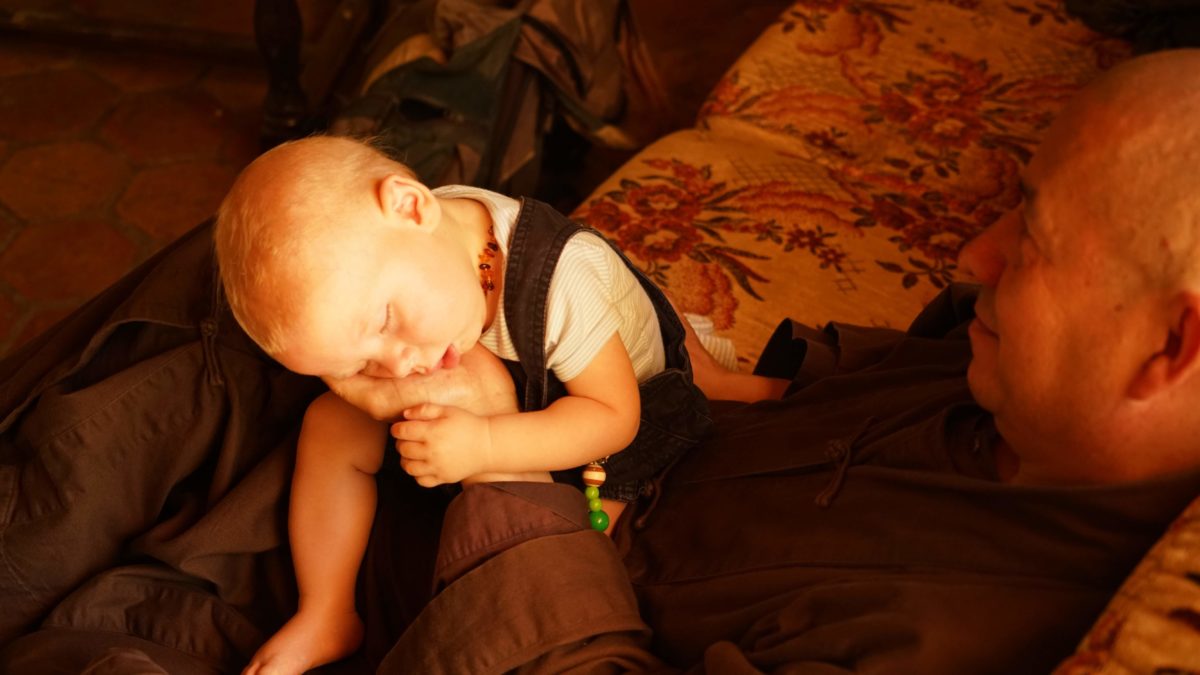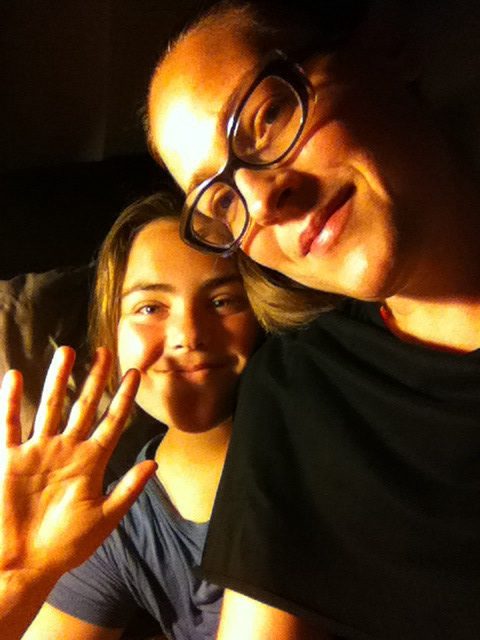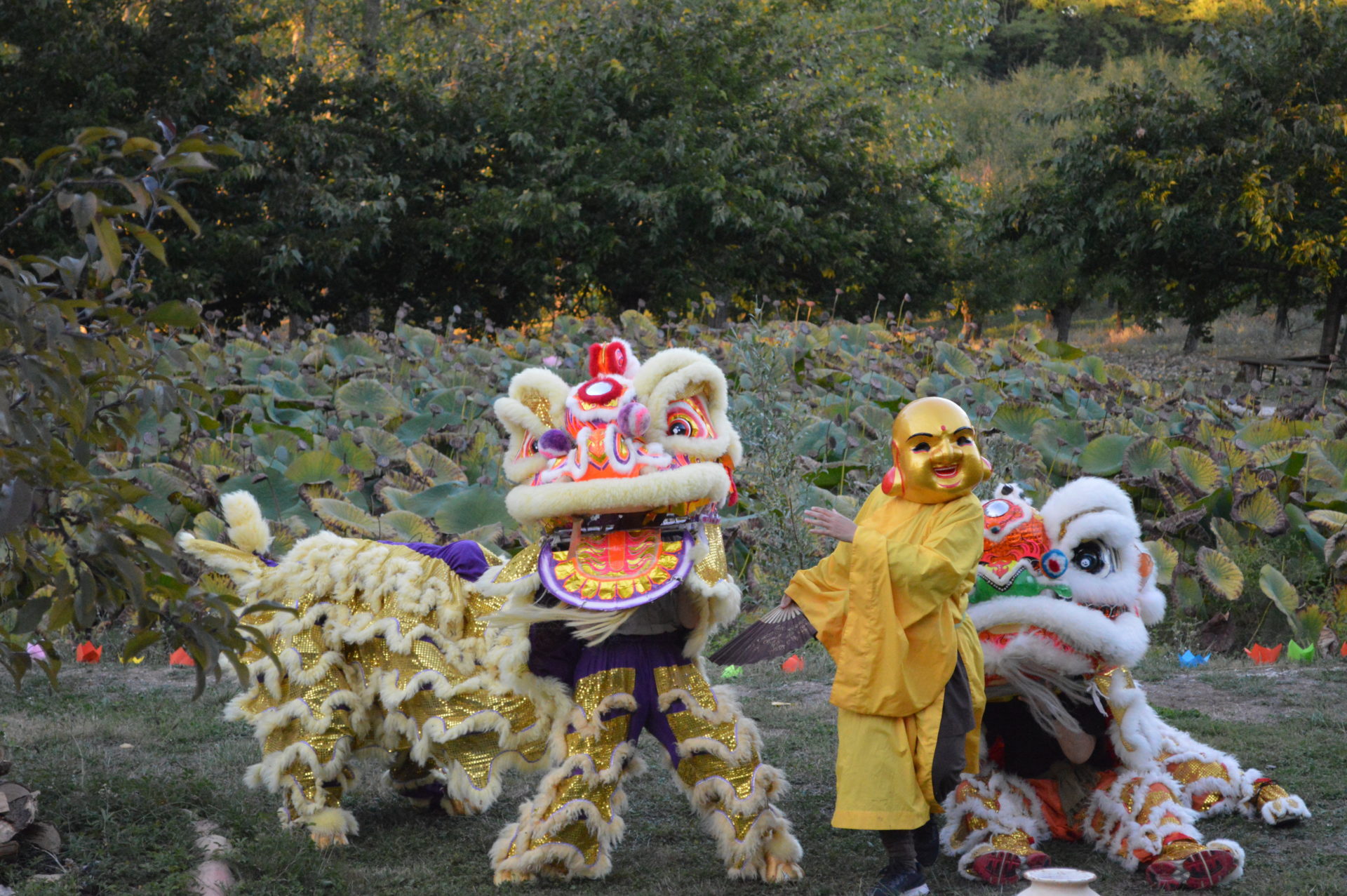Being Truly Present for a Temper Tantrum
By Yvonne Mazurek

During the 2017-2018 winter retreat, some of the neighbors joined twenty long-term volunteers in Upper Hamlet, Plum Village, for weekly classes dedicated to the Buddha’s earliest teachings. These classes have enriched our relationships as lay friends living in and around Plum Village.
Being Truly Present for a Temper Tantrum
By Yvonne Mazurek

During the 2017-2018 winter retreat, some of the neighbors joined twenty long-term volunteers in Upper Hamlet, Plum Village, for weekly classes dedicated to the Buddha’s earliest teachings. These classes have enriched our relationships as lay friends living in and around Plum Village. We learn from both our monastic teachers and each other, while fostering our spiritual friendships.
One day, our ears perked up as Brother Phap Bieu discussed the right way—and wrong ways—to embrace suffering. He explained that if we embrace ill-being the wrong way, we feed it. As it grows stronger, this sensation forms a knot and, each time we repeat this habit, the knot grows bigger. He explained that only true presence can create the space we need to transform a knot. To illustrate his point, our teacher gave the example of a child who whines until they get what they want. By embracing a child who whines, an adult can inadvertently train a child to receive attention through their suffering.
Emelina, a neighbor who works from home with her husband, bowed in to share about a recent knot she had broken through: her two-year-old Sonia’s taxing bedtime ritual. Until recently, Sonia became cranky, needed a bottle of formula, and asked for one or more adults to read to her until everyone fell asleep together in the big bed. With another baby on the way, Emelina knew these habits were allowing neither the parents nor Sonia the space the family needed.
She wanted to explore the right way to embrace Sonia’s suffering and turned to Ester, a fellow practitioner and mother who has specialized in supporting families in mindful parenting. Emelina and Ester decided to spend a few days together at Emelina’s house to get to know each other better. This gave the two friends a chance to explore children’s basic needs, including food, health, and cleanliness, and especially how to be truly present with a child and their emotions.
In some way, Emelina asked Ester to shine light on the family’s habits. It became evident that Sonia needed some downtime to release built-up tension. This meant, for example, that Sonia could take twenty minutes to play and/or to share with her parents at the end of the day. Ester also noticed Sonia was very open-minded about food and readily ate, so she didn’t need to supplement her diet with formula.
Since these observations seemed reasonable, Emelina and her husband shared an insight with Sonia to change some habits: “Tonight we’re going to bed without a bottle.” Sonia embraced this opportunity for change and helped put the bottles away for good. Most importantly, bedtime needed to be a time when Sonia felt safe and content to fall asleep. On their third evening together, they decided to help Sonia make this transition. The father was away, and it gave the household a good opportunity to tweak the bedtime ritual.
Together they sent a very clear message to Sonia: “We are here for you and we know you can do it.” Emelina, with Ester’s help, had reinforced the joyful message of Sonia’s evolution over the past few days. They had prepared a toddler-sized bed with Sonia, explaining that the old crib was for her sister who was due to arrive in the coming months. After dinner, Sonia brushed her teeth and was asked to choose only two books to be read while sitting in bed with a grown up. She picked books from her pint-sized bookshelf and climbed into bed. After her nighttime reading, they prepared all the dolls and stuffed animals together. Emelina was "clear and complete" about her expectations with things moving forward like this.
The next hour was unforgettably painful, yet releasing. Ester sat on one side of the room, breathing peacefully, and Emelina sat on Sonia’s bed. Sonia quickly realized things were not going as she had planned and threw a tantrum. Emelina knew this would happen and was prepared to face it. For the first time, she heard in Sonia’s fit an anger coming from the toddler’s frustration over not having things her own way. Emelina understood this request wasn’t healthy and stayed composed. She recognized her daughter’s suffering and mirrored this information back to her by saying, "I know it’s hard, but you have everything it takes to sleep in your own bed now."
When Sonia kicked and flailed, Emelina confidently held her in a lying position and breathed as her daughter’s anger slowly waned. The rebellion went through several waves, but Emelina stayed solid and loving. Instead of rescuing Sonia from her discomfort, Emelina chose to be deeply present with her. Sonia was learning to quiet herself and to gain awareness of an unfamiliar, but safe situation. The toddler eventually fell asleep after heavily breathing for a while.
At three o’clock in the morning, the same situation repeated itself. The choices and support system stayed the same. Even though it’s more difficult to be mindful in the middle of the night, Emelina and Ester stayed strong, and Sonia fell back asleep. The next evening, the three repeated the same steps, but Sonia only needed twenty minutes to fall asleep.
Emelina realized she’d been embracing her child’s suffering unskillfully because she was using means her daughter had outgrown. With the help of a Sangha friend, she looked deeply at some of the issues that entangled with the bedtime ritual. When granted the right space and guidance, Sonia relaxed, expressed her preferences, participated in preparing her little nest, and learned to ease herself into a good night’s sleep. Months later, Sonia continues to enjoy two stories. Some nights are less smooth, but overall everyone appreciates the new freedom the family has gained.
As a practitioner, Emelina also gained clarity about the third of the Fourteen Mindfulness Trainings on freedom of thought: “Aware of the suffering brought about when I impose my views on others, I am committed not to force others, even my children, by any means whatsoever… to adopt my views.” She realized that views and limits are two different things. In fact, limits help people gain clarity. By establishing clear boundaries, Emelina and her family could learn to navigate between the two extremes of pity and severity to simply be present. This deeper presence creates a space within, which she and her partner can parent with wisdom and compassion. This better way of embracing suffering has changed their everyday life.
Through her sharing, Emelina also enriched the winter retreatants’ outlook on community life. Halfway through the winter retreat, many of us started pining for the world outside the boundaries of the practice center. Just as Emelina sat next to her distraught daughter for hours, we became aware that we too can recognize our difficulties and learn to accept the way things are. By listening to our friends’ real-life experience, we gained a glimpse into the difference between suppressing suffering, catering to it, and being truly present for ourselves. This precious story also gave us the opportunity to continue healing the mother-child relationship that continues to play out in each one of us. Her love, solidity, and determination brought the Buddha’s teachings to life.

Yvonne Mazurek, True Virtue of Perseverance, loves Thay and his teachings. She coordinated Wake Up Schools for many years and now supports Plum Village, France, with archiving and editorial assistance.

